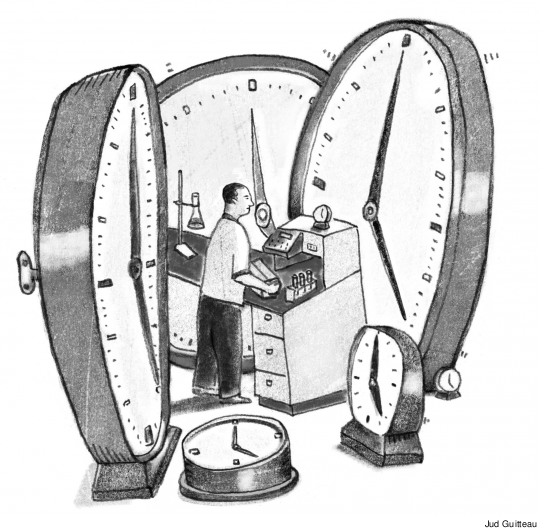Among numerous complaints I’ve heard from colleagues regarding the University’s top-down management proclivities, those voiced in protest to the time-devouring interface of CUNYfirst pale in comparison to responses I’ve heard regarding the recent decree directed at College Lab Technicians (CLTs), Higher Education Officers (HEOs) and related titles. It demands not only daily time sheet reporting, but the absurd and utterly unworkable addition of supervisory pre-approval for any deviation in a fixed set of hours and lunch breaks.

Not a Walmart
We are the City University of New York, not Walmart. I do not see why this fact is not as clear to everyone at the University level as it is to us down here among the students. The idiosyncrasies inherent in the daily operations of any modern university are not so complicated that they cannot be absorbed by an administrator responsible for efficient accounting, provided that administrator takes the time to look. In a spirit of cooperation, I offer this assistance:
1. Not all CUNY lab technicians work in laboratories.
2. Even laboratories deviate from neat, weekly schedules.
3. Not all problems requiring the special attention of a lab technician correlate to a strict schedule. It’s the reason why they are perceived as problems and require a person to solve them.
Getting pre-approval for a deviation in a schedule calls not only for each lab technician to foresee problems with prophetic specificity, but as deviations occur they must then get clearance from a supervisor who is not under the same time-clock strictures, and therefore not always available for consultation. Moreover, the reason so many supervisors are not available is because they are doing the other things that they are paid to do, which is one of the reasons why technicians and other support staff are so important. As anyone paying attention already knows, the job of a City University Lab Technician is inadequately illustrated by the title itself.
Archaic
I thought we left the factory model behind us when we stepped into the information age. Apparently some administrators still think in terms of Henry Ford’s lunch whistles. It’s stunning to me – and from the tone of the e-mails I’ve read from other technicians, it is stunning to them as well – that whoever decided to launch this effort appears to have no sense of the human variables that make up a day in a college department. We are here to serve the public. We cannot do so by dismissing a student, or an instructor in need, in order to comply with some fantasy timetable that threatens to transform the office into a pumpkin at the stroke of 12.
We all understand that as a public institution, there are responsibilities that must be met. And if this time sheet nonsense was the best way the University administration could respond to a legitimate demand on the part of those elected to govern our institution, then we are not in disagreement with the goal, just the method. Personally, I find it insulting. In a kind mood I would characterize a minute-by-minute time sheet as unimaginative. Acquiescing to my emotion – and I dare say to that of my colleagues – I would be more inclined to characterize it either as the work of an administrator ignorant of the human fundamentals of their charge, or a management bureaucrat who, cowering at the sight of their own supervisor, chooses to throw everyone else under the bus.
No one at the college level that I have spoken to on the matter thinks this is an improvement. Many seem tempted to concoct strategies to overcome its built-in irrationality. And to be honest about it, such strategies are not necessarily rebellious. They represent a sample of what most of the college staff, particularly lab techs and HEOs, accomplish on a daily basis with professional integrity.
Such strategies are an expression of the same imaginative and energetic spirit that inspires us to come to work each day and untangle red tape, so we can better serve the public. At the college level, the public does not appear exclusively as data, percentages and indices. They are people, often with their children in tow, attempting to overcome serious odds in order to earn an education and improve their lives. And we often help these people at the expense of time initially dedicated to our lunch and to our own families.
When the job requires it, we stay. We do not look at the clock when there are people to serve. We keep our own hourly balance – in the best of circumstances with the cooperation of the chairperson – and the work gets done.
Productivity
These new rules reveal a basic disrespect, not only for the work we perform, but for the enthusiasm, imagination and, most of all, the flexibility we bring to that work. We’re all interested in making each college function more efficiently. We all want maximum productivity. But if an administrator’s job is to look for ways to increase productivity, it is their managerial duty to increase it throughout the system. Any method that advances the productivity of one office by sabotaging that of another is not improving anything.
______________________________
Peter Malone is a chief CLT and art gallery director at Kingsborough Community College.
Related article: CUNY Is Imposing New HEO/CLT Time Sheets: PSC Says Record All Your Hours

